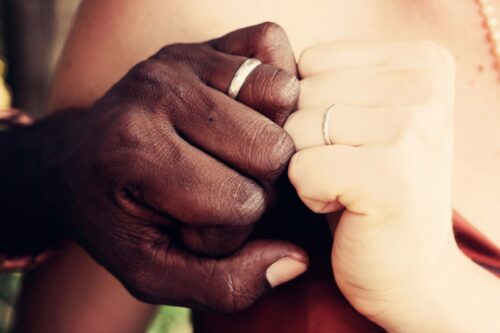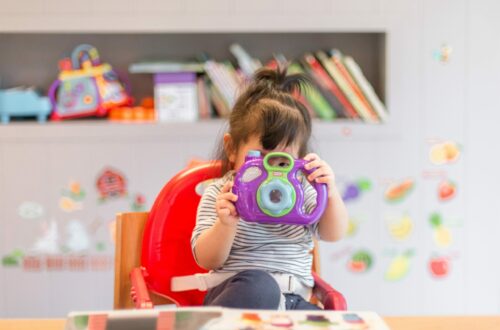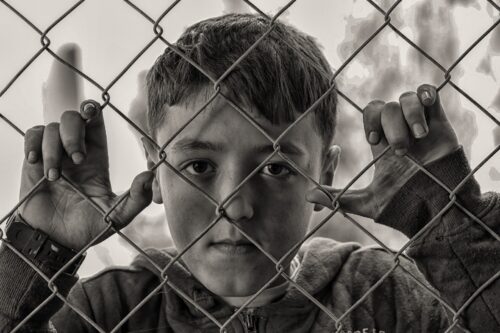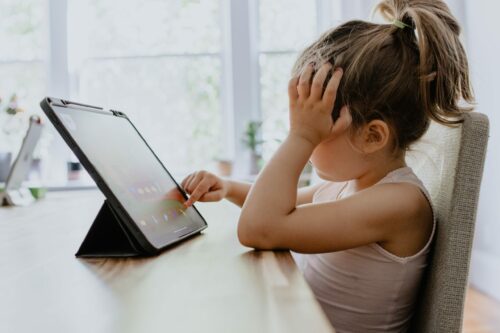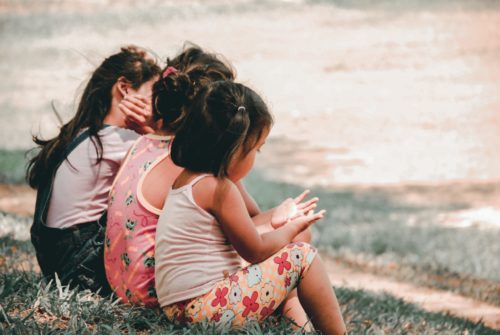
Five Ways I Plan to Protect My Daughter from Pornography
As parents, there are many things we want to protect our children from, but how do we actually protect them from pornography?
A few months after my husband and I were married, I found out I was expecting our first child. We soon learned I was carrying a little girl. The news completely surprised me. I always felt I would be better suited as a boy mom and my husband comes from a family of 7 boys and 1 girl, so I just imagined a future full of snakes, sticks, and ER trips.
I felt entirely unprepared for pink, frilly dresses, and bows. The prospect was terrifying.
But there was one thing I knew, long before I held her in my arms:
I have to protect her.
In the year since her birth, my “protection” has been from basic things like pulling knives out of the dishwasher, or keeping her from hurling herself over the back of the couch and onto our tile floor. Nothing too extreme and definitely nothing to do with pornography. But I know that time is coming.
Studies show that the average age of first exposure is 9 years old, and getting younger. Friends of mine have had to have hard conversations with their daughters at 7, 6, even 5 years old.
For years, we’ve cast pornography as this thing that we only need to talk to boys about and only when those boys are teenagers, or preteens.
It gets lumped in with “the talk,” we wait for them to get caught, or it gets completely ignored. There’s a very unfortunate attitude that “boys will be boys” and “what can you expect from them?” (I’ve already written about that toxic message and how it damages our men).
But here’s the deal, if you are only worried about your sons, and only when they are teenagers, chances are, you’re going to miss your shot with each and every one of your kids. We can’t take a laissez-faire approach to this issue.
We have to be proactive in protecting both our sons and daughters from pornography, and we have to start much earlier than puberty.
I’ve given this a lot of thought over the years as I’ve shared my story and talked with parents. I’ve worked with groups like Protect Young Eyes and Protect Young Minds to help equip parents to address this issue. But it just feels different when you’re the parent. Suddenly all of the great ideas you share from the stage start to feel really intimidating. Will they be enough? Will I be able to do them?
But what I’m learning in my journey as a mom is it’s really helpful to not try to do all the things all at once. I’m a bad mom and a generally unpleasant person when I try to accomplish a zillion different things in a 24 hour period or when I try to do things I’m simply not gifted to do.
So, I thought through all of the “tips” I’ve given parents over the years and picked 5 that I definitely want to implement to try to protect my daughter.
It’s not a question of if but when.
My daughter is going to see pornography. Do I want her to see it? Of course not. At this point though, at some point in her life, she is going to see it at least once. It might be at a sleepover at friend’s house or while innocently searching for something for school. It might be a softcore picture that pops up on her screen or it might be a hardcore video that she watches through to the end. She is going to see it. That’s, unfortunately, the nature of our culture right now.
A friend just shared a story of her daughter accidentally stumbling onto the dark side of YouTube. As far as my friend knew, there wasn’t even internet access on the device she was using, but some app allowed her little girl to get online and she was literally one click away from pornography.
What does that tell me as a mom?
That tells me no matter how hard I try to protect, block, filter, it’s still very likely pornography will find my daughter. It’s hunting her.
Please understand, this is not a fatalistic approach of “Well, she’s going to see it eventually.” This is a very real recognition that nothing I do can ever guarantee that my daughter will never see pornography. Nothing.
But you better believe I’m going to do my best. Early exposure to pornography can be traumatic and damaging to a child. I was exposed at 13 while just innocently researching for school. That was in 1999, before smart phones, before high speed internet, before “apps” and YouTube and social media. The world is a completely different beast now.
Which means the steps I take need to address two different areas of defense:
Delaying Exposure
Building Resistance and Resiliency
My first priority as a parent is to delay my child being exposed to pornography for as long as I possibly can. Since most pornography exposure happens through technological channels, then the best line of defense is to regulate her exposure to technology.
(Side note: there is a great documentary that just came out called Childhood 2.0. You should watch it and share it.)
1- Limit exposure to technology
Every time I hand my daughter something that can access the internet, I risk pornography finding her.
And it’s easier to build a habit than it is to break one, so we simply don’t give our daughter anything that can get on the internet. The closest she gets is playing with my locked cell phone. She can pull up the camera and the worst that happens is I end up with a bunch of pictures and videos courtesy of her fascination with the buttons. That’s it.
We hope to raise her without a “need” for technology. We’re starting now, because it will be easier than trying to “break” her of it when she’s in second or third grade.
Of course, I understand that I am writing this in the age of COVID and virtual schooling. At this point, if our daughter were old enough to be in school, she would have a legitimate need to use technology. That’s why it’s “limited” and not “banned.” You have to be flexible and able to adapt to circumstances. Does watching a DVD on a long car ride save your sanity? Go for it. Does handing your toddler a tablet with a baloon popping game help make dinner more enjoyable? Great.
2- Establish Guidelines for Technology Use
Obviously, our one year old doesn’t have her own piece of internet-access equipment, so it might seem strange to have “guidelines.” Plus, she’s one. It’s not like she’s able to comprehend a “Ten Commandments of Internet Use.” But this builds on the idea that it’s easier to build a habit than break one.
If I’m constantly handing her a tablet with videos and setting her down away from me, at what age do I implement the rule that she has a time limit and has to use it in the kitchen? What if those were always the “rules” even before she could understand them as such?
A few years ago, when I was speaking to a group of women in New Zealand, I challenged the parents that they need to mirror healthy use of technology for their kids. That starts young. Put the same guidelines in place for your toddler that you would if they were a teenager, and follow them yourself.
For instance, one of our “house rules” is no internet in the bedroom. I personally know the toxic combination of bedrooms, boredom, and technology, so phones, televisions, and computers will not be allowed behind closed doors for our children. We decided it was a good rule for us too.
My husband and I don’t bring our phones into our room except on rare occasions when we need to be available in case of an emergency, for instance, when either of us is out of town. Otherwise, our phones spend the night charging in the office or the kitchen. The only piece of “tech” in our room is our two alarm clocks. Honestly, science shows it’s better for sleep anyway.
3- Keep pornography out of our home
Many stories of exposure as children start with the kids finding someone else’s pornography. I’ve had women share that they walked in on their parents watching pornography, or found a DVD of pornography in the DVD player, or found the magazines stashed under the bed.
It’s foolish for parents to think they can have a “guilty pleasure” that their children won’t find. If you, as a parent, are consuming pornography then you are exponentially increasing the chance they will find it. All they have to do is pick up your phone once or ask to borrow your tablet for something.
Another way to keep pornography out of the home is to block it at its source. My friends at Protect Young Eyes have a great write-up on wi-fi routers and parental controls that you can read here.
Blocking inappropriate content at the source is a great way to protect young children (before they’re old enough to figure out how to hack around it). But there will come a day when my best defenses may not be enough. My baby girl might be sitting beside someone on a plane who is watching pornography and all of my limits on technology and filtering will be ineffective.
That doesn’t mean I’ve failed as a parent.
I repeat: if your child finds pornography it doesn’t mean you’ve failed as a parent.
My goal is to do my absolute best to protect my daughter from stumbling onto pornography. But so many (too many) parents believe that the important thing is to make sure their child never sees pornography. Ever. They have rules upon rules upon rules all trying to create an impenetrable fortress that illicit material cannot get through.
Unfortunately, at some point, your child will leave that fortress and all of the chain mail in the world isn’t going to matter if they can’t take it with them. You have to teach them how to fight this battle themselves. They need an internal resistance, not just the external ones you put in place.
That’s the idea of “building resiliency.”
Think of it this way: your child is going to see pornography, then what? How do you train them to have the proper response to viewing pornography? How to you make them internally resistant to pornography?
4- Age Appropriate Discussions About Sex, Pornography, and More
When it comes to talking to our kids about sex, parents are often so burdened by this idea of “robbing their innocence” or this fear that the parent will be the one who accidentally introduces them to pornography.
(Tip: Unless you’re actually handing them a phone with pornography pulled up and having them watch the video- which is child abuse- you aren’t introducing them to pornography.)
We can take this ostrich, head-in-the-sand approach to these issues, feeling if we say nothing then it will never be an issue.
And that’s simply not the case.
When you talk to your children about this issues in age-appropriate ways, you’re not robbing them of anything. In fact, you are protecting them. You are doing so by giving them context for experiences they may have and by showing that you aren’t afraid to have these conversations. Both of those are vital.
If you say nothing, and pornography gets to them first, then they will turn to pornography to answer all of their questions about sex. It will become their sex education, and it is terrible sex education.
In our home, we have a copy of Good Pictures, Bad Pictures Jr and Good Pictures, Bad Pictures. These books are great for introducing the concept of pornography to children (ages 3 and up) and teaching them what to do if/when they see it. It gives them a plan, which helps them feel in control, which will help lessen any trauma experienced by an exposure to pornography.
5- Affirm Her Worth (and the Worth of Others)
For me, this one is absolutely the most important. If I did nothing else on this list, I would die trying to do this one well.
I want my daughter to know, without question, that she has intrinsic worth and value and so does every other human being on the face of this planet.
I want her to know that she is created with a purpose and loved fiercely.
I want her to know that her sex drive is something good and Godly, nothing to be ashamed of, and nothing to be misused.
She may be young, but we’re starting already to build a home where she is safe to be exactly who she is created to be. We don’t have some lofty dream or expectation for her. God has entrusted us with a person, not a mini me. We love watching her personality grow and develop and believe it is our calling to nurture this little person and help her grow into the fullness of who she is intended to be.
One of the ways that pornography sinks its claws into people, girls especially, is by “showing them love.” It’s not love by a long shot, but something in pornography speaks to the heart of women, especially those who feel they desperately need male attention. This can be because of “daddy issues” or simply because of insecurities that any of us are susceptible to.
Pornography preys on lies. We build resistance to that by pumping hearts full of truths, truths about the dignity of human life, truths about what love really looks like, truths about healthy relationships and sexuality, truths that combat every lie pornography tries to sell.
All of the steps are a means to this end.
I want to delay exposure as long as can in order to buy time to build her up, so that when the lies come slithering in trying to trap her, she sees them coming from a mile away, calls them out, and walks away.
It’s honestly my hope that my daughter never sees pornography. If she does I hope it isn’t for a very long time and that when she does she recognizes it for the life-stealing, love-destroying, dehumanizing mess it is, knows it will do nothing for her, and wants no part of it.
The great thing is, these are steps you can implement whenever. It’s never too late to build a framework that helps protect your children.
For more great resources on protecting children, I recommend checking out:
